Unit 2 Growing pains Grammar and usage
文档属性
| 名称 | Unit 2 Growing pains Grammar and usage | 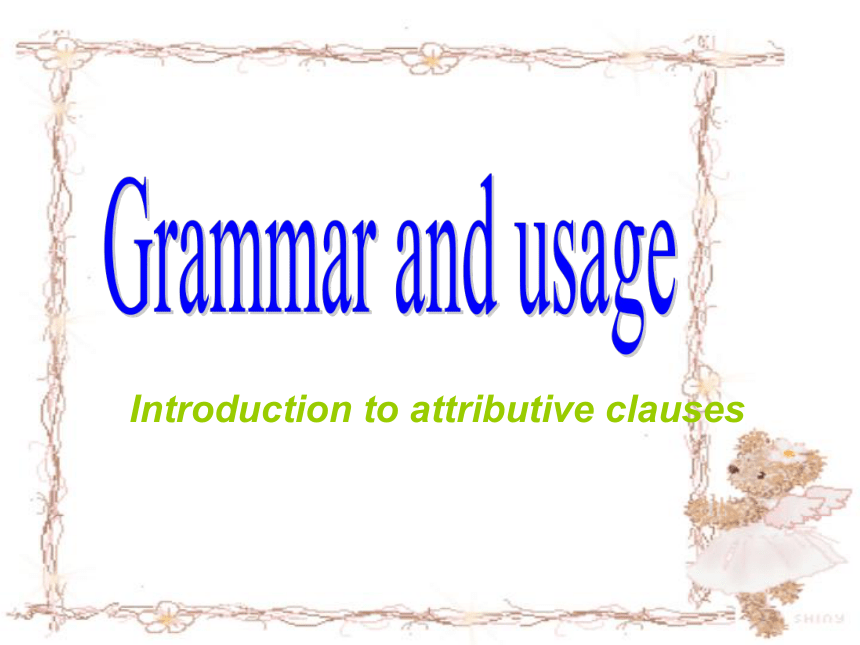 | |
| 格式 | rar | ||
| 文件大小 | 222.7KB | ||
| 资源类型 | 教案 | ||
| 版本资源 | 牛津译林版 | ||
| 科目 | 英语 | ||
| 更新时间 | 2011-05-14 06:47:51 | ||
图片预览

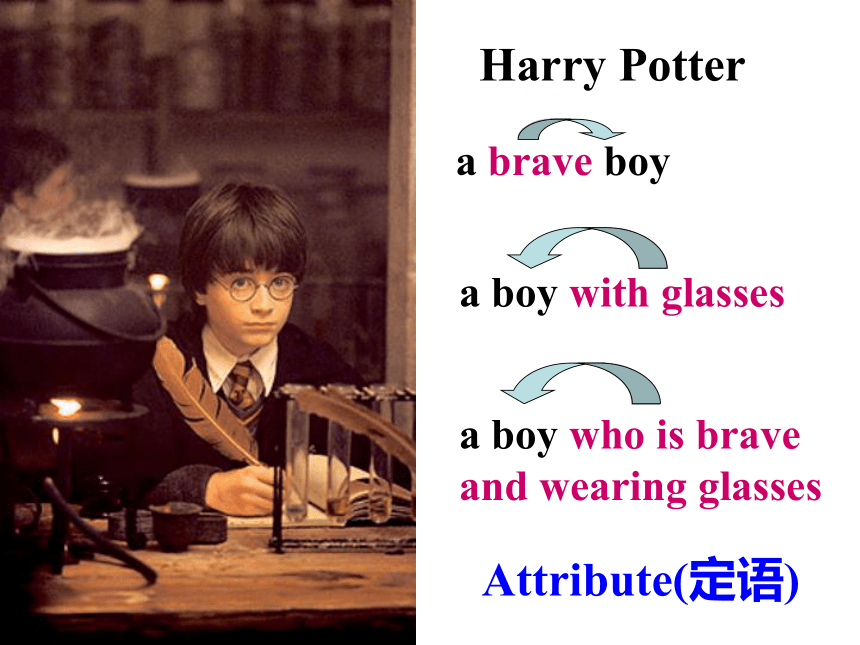
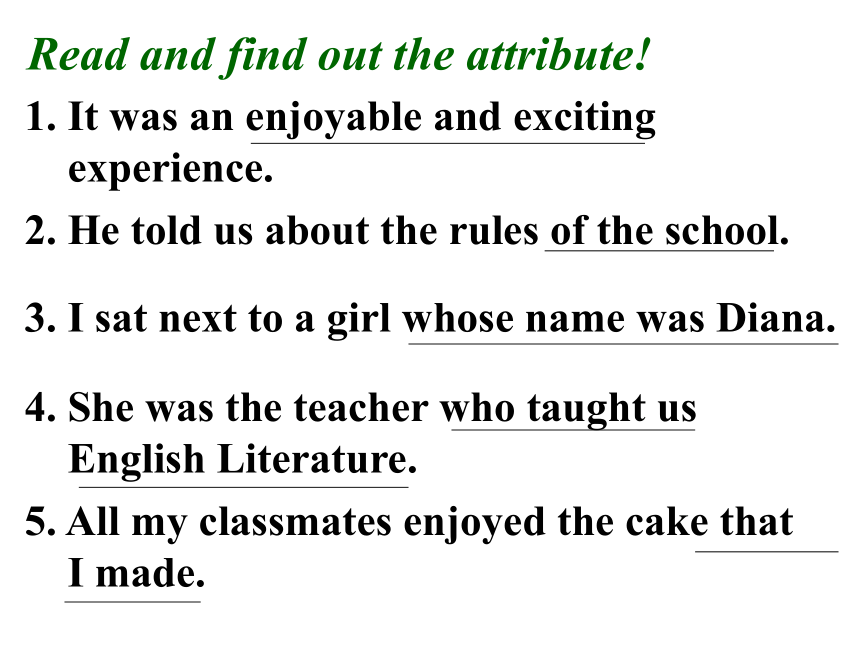
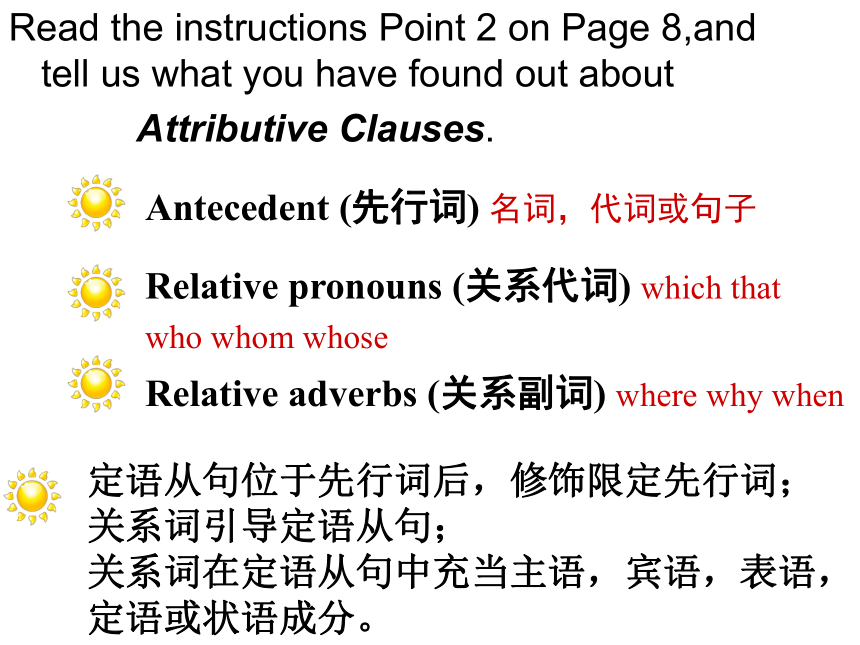
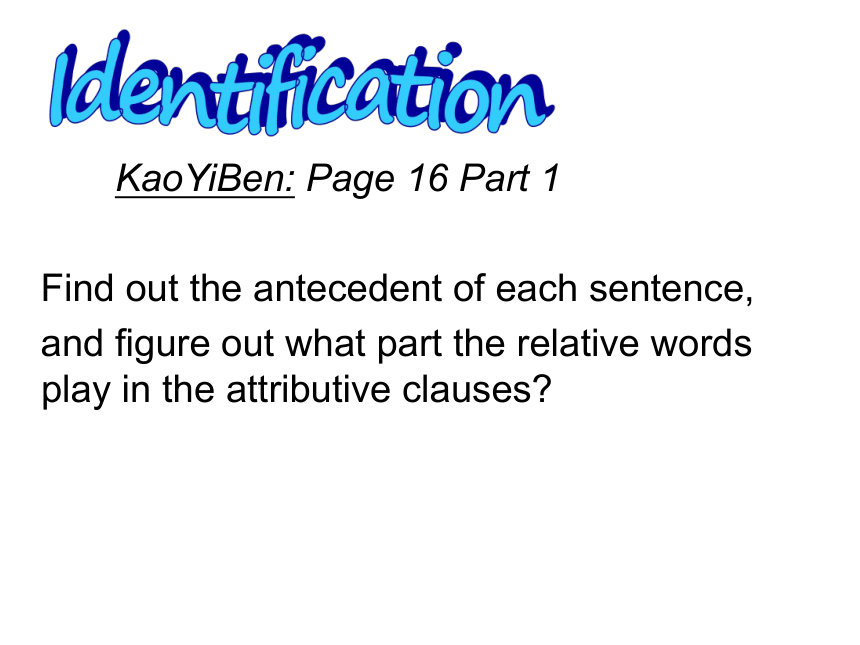
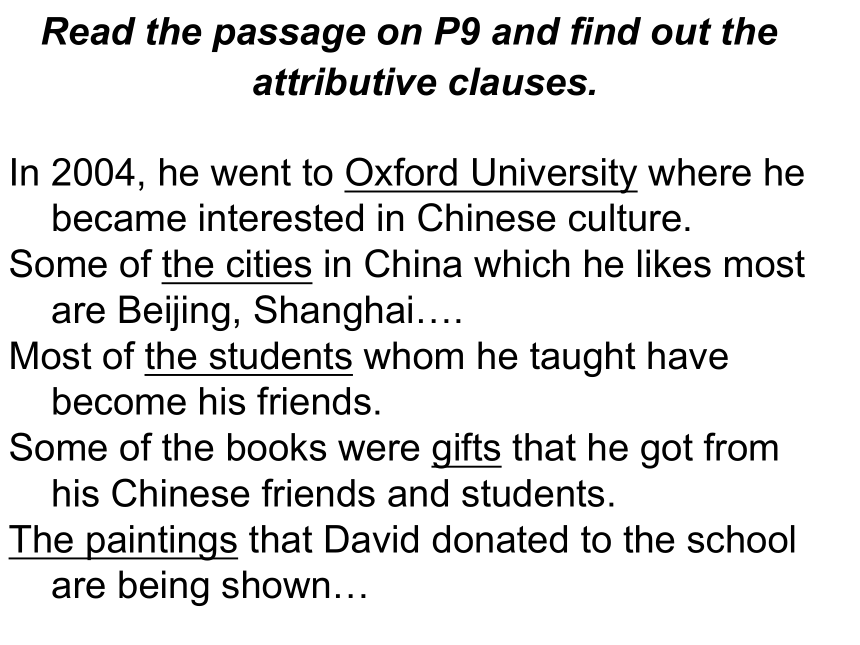
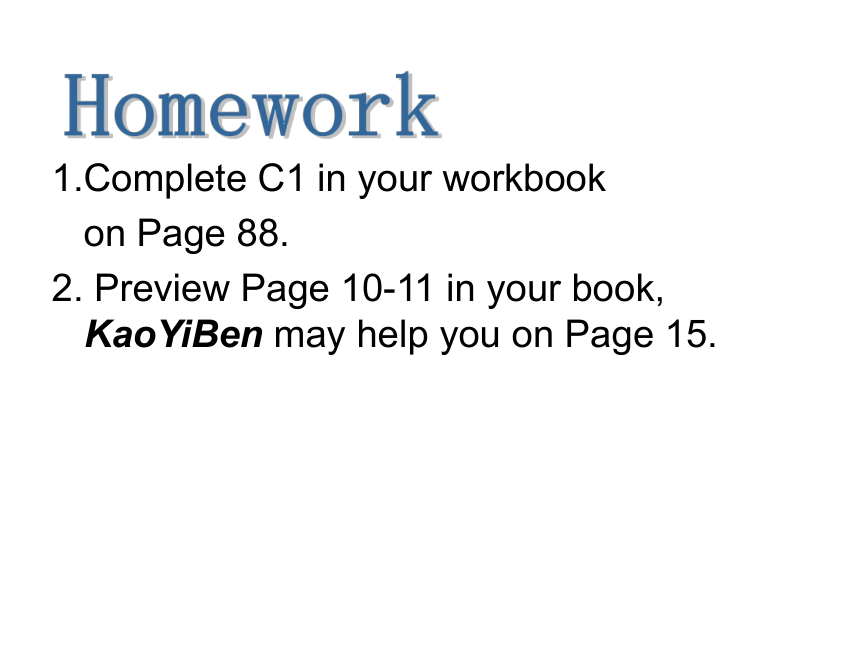
文档简介
(共16张PPT)
Introduction to attributive clauses
Harry Potter
a boy with glasses
a boy who is brave and wearing glasses
a brave boy
Attribute(定语)
Read and find out the attribute!
1. It was an enjoyable and exciting experience.
2. He told us about the rules of the school.
3. I sat next to a girl whose name was Diana.
4. She was the teacher who taught us English Literature.
5. All my classmates enjoyed the cake that I made.
Read the instructions Point 2 on Page 8,and tell us what you have found out about
Attributive Clauses.
Relative adverbs (关系副词) where why when
Antecedent (先行词) 名词,代词或句子
Relative pronouns (关系代词) which that who whom whose
定语从句位于先行词后,修饰限定先行词;
关系词引导定语从句;
关系词在定语从句中充当主语,宾语,表语,
定语或状语成分。
KaoYiBen: Page 16 Part 1
Find out the antecedent of each sentence,
and figure out what part the relative words play in the attributive clauses
Read the passage on P9 and find out the attributive clauses.
In 2004, he went to Oxford University where he
became interested in Chinese culture.
Some of the cities in China which he likes most
are Beijing, Shanghai….
Most of the students whom he taught have
become his friends.
Some of the books were gifts that he got from
his Chinese friends and students.
The paintings that David donated to the school
are being shown…
1.Complete C1 in your workbook
on Page 88.
2. Preview Page 10-11 in your book, KaoYiBen may help you on Page 15.
Relative pronouns
Read the instructions on Page 10 and fill in the blanks below.
关系代词___________________________ ___________
先行词指人时,关系代词用_________ _________________________
先行词指物时,关系代词用————————————
关系代词在定语从句中作______时可省略.
表示所属关系,指人的或物的,并在从句中
作定语用_________
which / that
who/whom/that
that / which / who / whom
/ whose
宾语
whose
Practice: Page 11 Part A&B
I am sure she has nothing that you can borrow.
(1) 先行词为all, everything, nothing, anything, little, much 等不定代词时。
“That” is usually used in the following situations.
(2) 先行词被all, every, no, some, any, little, much等修饰时。
I’ve read all the books that are about this matter.
I’ve read every book that is borrowed from the library.
(3) 先行词被序数词或形容词最高级修饰时。
This is the first book that he has read.
This is the most interesting book that I have ever read.
(4) 先行词被the only, the very修饰时。
This is the very book that belongs to him.
Complete Part II in KaoYiBen on Page 16.
Workbook Page 88 C2: Rewrite each pair of sentences, using an attributive clause
KaoYiBen on Page 16 Part III.
Introduction to attributive clauses
Harry Potter
a boy with glasses
a boy who is brave and wearing glasses
a brave boy
Attribute(定语)
Read and find out the attribute!
1. It was an enjoyable and exciting experience.
2. He told us about the rules of the school.
3. I sat next to a girl whose name was Diana.
4. She was the teacher who taught us English Literature.
5. All my classmates enjoyed the cake that I made.
Read the instructions Point 2 on Page 8,and tell us what you have found out about
Attributive Clauses.
Relative adverbs (关系副词) where why when
Antecedent (先行词) 名词,代词或句子
Relative pronouns (关系代词) which that who whom whose
定语从句位于先行词后,修饰限定先行词;
关系词引导定语从句;
关系词在定语从句中充当主语,宾语,表语,
定语或状语成分。
KaoYiBen: Page 16 Part 1
Find out the antecedent of each sentence,
and figure out what part the relative words play in the attributive clauses
Read the passage on P9 and find out the attributive clauses.
In 2004, he went to Oxford University where he
became interested in Chinese culture.
Some of the cities in China which he likes most
are Beijing, Shanghai….
Most of the students whom he taught have
become his friends.
Some of the books were gifts that he got from
his Chinese friends and students.
The paintings that David donated to the school
are being shown…
1.Complete C1 in your workbook
on Page 88.
2. Preview Page 10-11 in your book, KaoYiBen may help you on Page 15.
Relative pronouns
Read the instructions on Page 10 and fill in the blanks below.
关系代词___________________________ ___________
先行词指人时,关系代词用_________ _________________________
先行词指物时,关系代词用————————————
关系代词在定语从句中作______时可省略.
表示所属关系,指人的或物的,并在从句中
作定语用_________
which / that
who/whom/that
that / which / who / whom
/ whose
宾语
whose
Practice: Page 11 Part A&B
I am sure she has nothing that you can borrow.
(1) 先行词为all, everything, nothing, anything, little, much 等不定代词时。
“That” is usually used in the following situations.
(2) 先行词被all, every, no, some, any, little, much等修饰时。
I’ve read all the books that are about this matter.
I’ve read every book that is borrowed from the library.
(3) 先行词被序数词或形容词最高级修饰时。
This is the first book that he has read.
This is the most interesting book that I have ever read.
(4) 先行词被the only, the very修饰时。
This is the very book that belongs to him.
Complete Part II in KaoYiBen on Page 16.
Workbook Page 88 C2: Rewrite each pair of sentences, using an attributive clause
KaoYiBen on Page 16 Part III.
